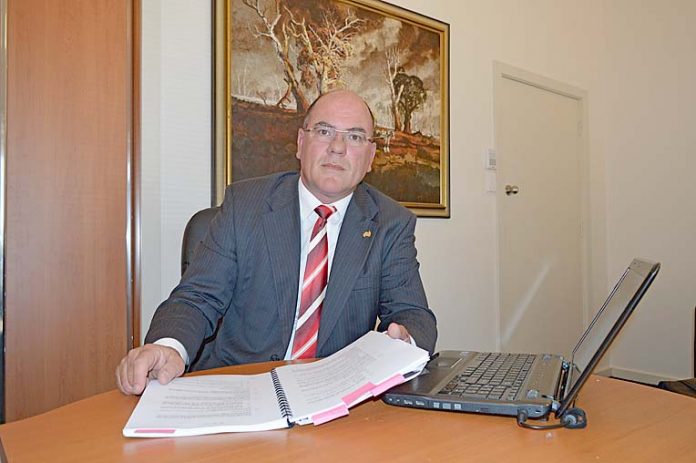THE wrangle between OneFortyOne Plantations and Wattle Range Council continued yesterday with OFO rejecting allegations it has been misleading the community regarding sawlog availability to local industry.
“We categorically reject the assertion that we have misled the community of the South East,” OFO chief executive officer Linda Sewell said in a letter addressed to Mayor Peter Gandolfi.
Ms Sewell’s reaction comes after Mr Gandolfi sent identical letters to Future Fund chairman Peter Costello and Finance Minister Mathias Cormann on October 19 asking them to clarify aspects of OFO’s role in the local timber industry.
These included a perceived shortage of log supply to local processors while exports continue unabated and the negative impact this could have on local job creation and sustainability.
“A vibrant domestic market is critical to the long-term health of the forest and our company, and we will continue to base all our decisions, including future investment, on that principle,” Ms Sewell said.
“There is a role for export to play in smoothing fluctuations in market cycles, but it is not a substitute for a stable, consistent domestic industry.”
Ms Sewell said to suggest OFO was focused on anything other than retaining Australian jobs and growing the local workforce within the Green Triangle “is misleading and raises undue concern”.
“Since assuming custodianship of the estate, OFO has worked tirelessly to help build a stronger, more sustainable domestic industry,” she said.
“Today the volume of sawlog fibre sold domestically is more than 45pc greater than at the time of acquisition.
“This effort should not be discounted as it represents a restoration of volume to be broadly in line with pre-Global Financial Crisis levels, despite there being fewer mills consuming a narrower product range.”
Ms Sewell said OFO has also reduced its export program in an effort to meet growing demand from existing local customers.
In this regard the export of A-grade logs was stopped earlier this year and OFO withdrew from the Korean market in July.
“Going forward, we anticipate the level of sawlogs exported will be less than 10pc of the total available sawlog from OFO’s plantation,” she said.
However, Ms Sewell warned the growing demand in the last four years has now absorbed the excess volume available.
“While this reflects the ongoing strong performance of our industry, it also means that our business is now almost entirely committed,” she said.
“Over the last six months we have had to decline a number of requests for additional volume by our existing customer base and from a number of parties considering future capital investment within the region.
“While we welcome further growth and additional investment by processors, there is a limit to the fibre available – namely, the trees that are already in the ground.
“Any substantive increase in supply from the forest will take a generation to materialise.
“We cannot, and will not, over commit the forest, nor operate on an unsustainable basis now or in the future.”
Mr Gandolfi also wanted clarification on the structure of OFO’s board and whether Australia’s Future Fund was indeed the largest shareholder.
However, Ms Sewell said “no single shareholder or company has a controlling interest in OFO”.
“While the Future Fund is our single largest shareholder and currently has two representatives on the board, it does not hold a majority shareholding, nor does it have a controlling interest on the board,” she said.
“We remain a proud majority Australian owned company.”
Mr Gandolfi told The Border Watch yesterday he was “disappointed” the Future Fund did not respond to his letter directly, but had chosen to allow OFO to speak on its behalf.
“It is also obvious a number of points I have raised in my letter have not been fully addressed, including disclosure of board representation,” he said.
“OFO has been secretive about its board representation and shareholding in general.”
Mr Gandolfi said he was yet to receive a response from Mr Cormann.








